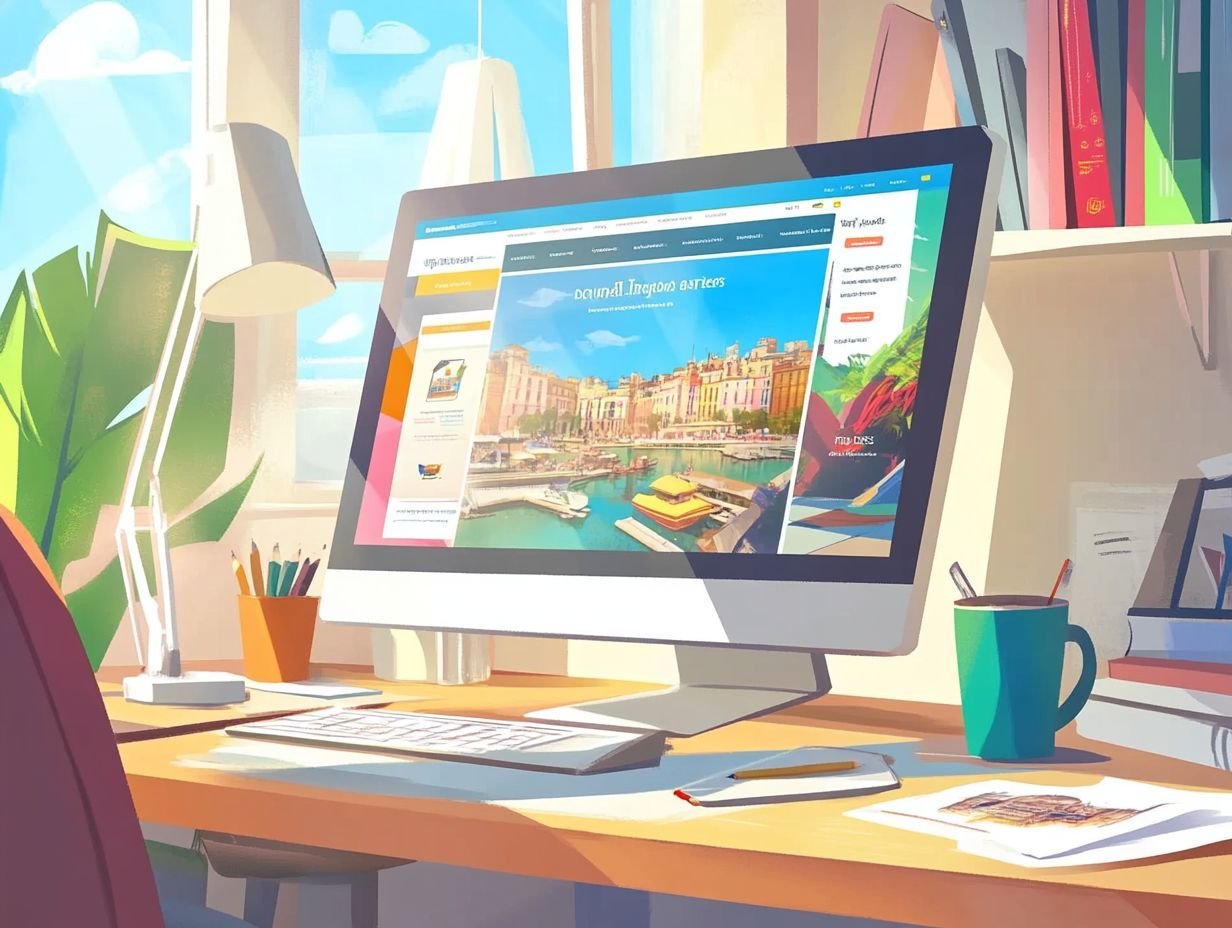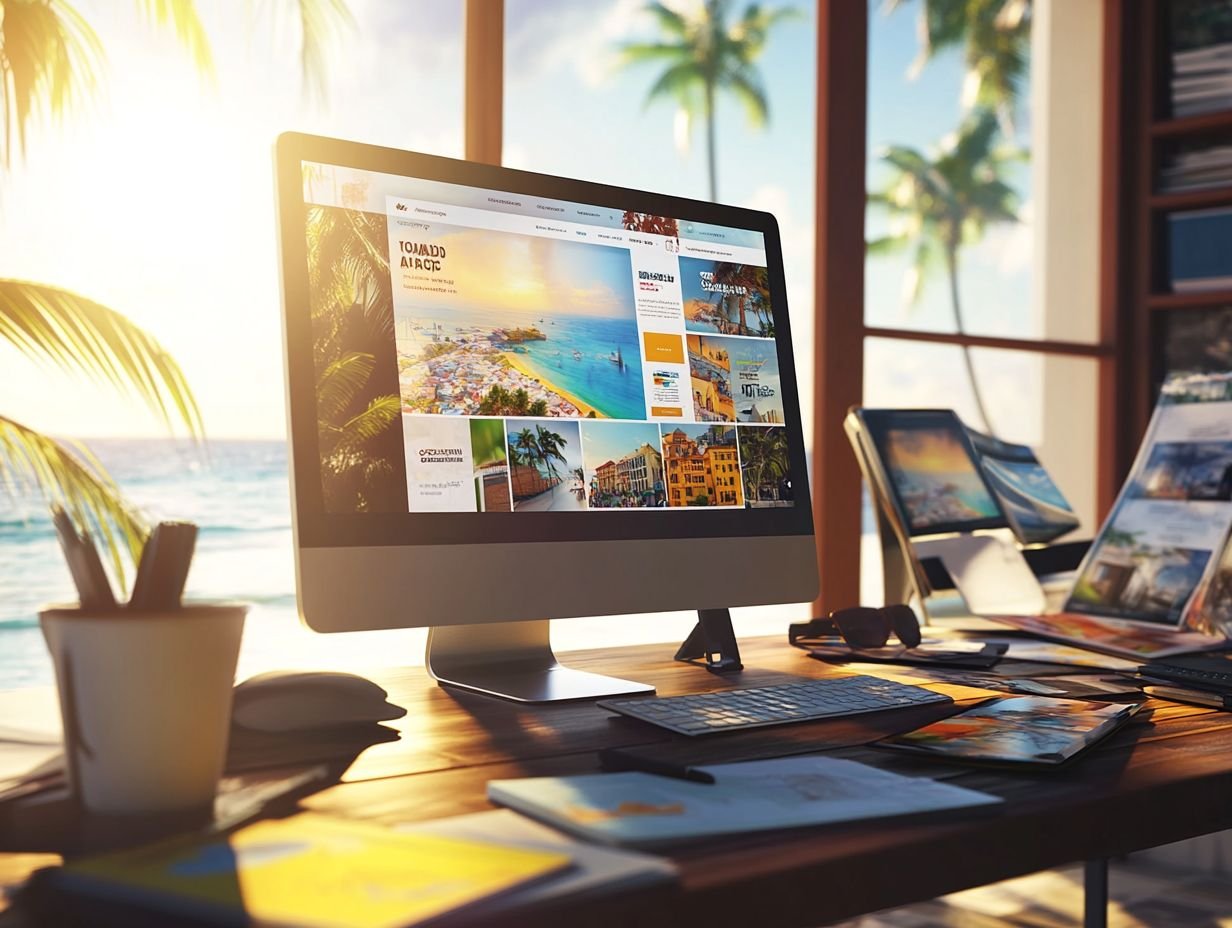If you want to stand out as an independent travel agent, a strong online presence isn’t just a nice-to-have—it’s an absolute must for your travel agency business.
Teaming up with a host agency is like having a trusty sidekick in your superhero journey. You’ll get industry support and access to a treasure trove of valuable resources that can really amp up your game.
This guide is your roadmap to crafting a killer travel agent website that meets all your website requirements. We’re talking must-have features, design tips that ensure you create a user-friendly website (because who has time for frustrating sites?), and those mobile optimization strategies that keep your site looking sharp on any device.
Plus, it’ll show you how to work social media like a pro and supercharge your SEO efforts to boost your visibility. Whether you’re just starting out or looking to polish that online strategy, this guide is packed with the insights you need to not just survive, but truly thrive as the best travel agency.
Key Takeaways:
- Joining a host agency can provide numerous benefits for independent travel agents, such as access to resources and support.
- A successful travel agent website should include key features and functionality, such as user-friendly design, website features, and mobile responsiveness.
- When choosing a website template, consider factors such as customization options and compatibility with your business needs.
The Benefits of Using a Host Agency

In the cutthroat arena of the travel industry, teaming up with a host agency can be your secret weapon to boost your independent travel agent game. Think of it as having a personal cheerleading squad packed with resources, support, and a sprinkle of credibility that can take your travel agency from “meh” to “magnificent.”
Host agencies serve up a buffet of essential travel services, customer feedback tools, digital marketing magic, and international tourists engagement—all the ingredients you need to charm them and keep your customers coming back for more.
Plus, they help you navigate the intricate maze of the travel landscape, making the whole booking process feel like a walk in the park. In a market that’s always on the move, this streamlined approach is key to not just surviving but thriving.
Why Joining a Host Agency is Beneficial for Independent Travel Agents
Joining a host agency is like finding the secret sauce for independent travel agents. You’ll get a treasure trove of benefits, including access to all those essential resources, a solid support system, and a buffet of travel packages that would feel like a wild goose chase to secure on your own.
These partnerships can turn your booking services into a well-oiled machine, making travel planning a breeze so you can wow your clients without breaking a sweat.
Plus, you’ll be swimming in valuable networking opportunities, rubbing elbows with industry experts and fellow pros who can spark collaborations and share some seriously good tips.
And let’s not forget about the marketing magic – host agencies often step in to help you promote your offerings. This support means you can cast a wider net in the competitive marketplace, supercharging your sales potential and driving that business growth like a pro. For tips on creating an effective travel agent website, check out Travel Agent Website Design: Tips and Templates.
Elements of a Successful Travel Agent Website
Building a successful travel agency website is like crafting the perfect recipe—there are several key ingredients that need to work together to entice potential customers and whip up an amazing user experience.
You know it’s crucial for driving those travel plans and racking up bookings. A user-friendly site with smooth navigation, integrated booking services, and all the travel information a wanderlust-filled heart could desire doesn’t just boost your online presence; it also amps up customer interaction and retention.
Before you know it, your agency will be the go-to spot for travel tips and vacation inspiration, and everyone will want to book through you!
Key Features and Functionality to Include
When you’re whipping up a travel agent website, remember to sprinkle in some essential features like a slick booking service, a secure payment gateway, and a customer support system that could make even your grandma feel taken care of. These elements aren’t just window dressing; they’re the secret sauce for attracting and keeping those customers coming back for more.
Think about it: an efficient booking service with integrated booking widgets can turn the usual travel arrangement headaches into a walk in the park. And let’s face it, nobody wants their personal and financial info doing the cha-cha on the internet, so safe payment options with a secure payment gateway are a must to keep those worries at bay. Plus, having a robust customer support system, including newsletter campaigns for regular updates, means you’ll be quick on your feet to answer questions and solve problems, which is a surefire way to keep your customers grinning.
Don’t forget to engage with customer feedback—it’s like having a treasure map to discover where you can level up your game. By honing in on areas that need a little TLC, you’ll enhance the overall user experience and cultivate loyalty that lasts longer than a layover in an airport lounge.
Choosing a Website Template
Choosing the right website template is like picking the perfect outfit for a first date—it’s crucial for making a good impression online!
Whether you’re going for a snazzy Joomla template or diving into a sea of travel website templates, remember that the design is basically the digital equivalent of your agency’s brand and services. So, make sure it’s looking sharp and ready to charm those users!
Factors to Consider and Popular Options

When you’re on the hunt for the perfect website template, you’ve got to keep an eye on factors like design, mobile responsiveness, and user experience. After all, you want to pick something that vibes with your travel agency’s goals and doesn’t make your visitors want to run for the hills.
Among the endless sea of options, platforms like Joomla, Strikingly, and Mobirise are like the shining stars in the travel agency galaxy.
A Joomla template is your go-to for customization, allowing you to flaunt your unique branding while still looking as polished as a freshly wiped rental car.
Then there’s Strikingly, which is all about those sleek single-page sites. It’s perfect for when you want to showcase your essential services without making your visitors feel like they’re lost in a labyrinth.
And let’s not forget Mobirise—this platform is like your tech-savvy best friend, offering drag-and-drop simplicity. Even if your tech skills are closer to “what’s a URL?” than “HTML,” you’ll still be able to whip up a snazzy, mobile-optimized site that captures clients’ attention on any device.
With mobile responsive design being the name of the game these days, especially since everyone seems glued to their smartphones, you’ll want to make sure your site is ready to roll wherever your travelers go.
Designing a User-Friendly Website
Designing a user-friendly website is like throwing a fabulous party where aesthetics meet functionality. You want your guests—aka visitors—to glide effortlessly through your travel information, engage with your services, and confidently make those bookings without tripping over any digital furniture.
It’s all about creating an experience that’s as smooth as a well-mixed cocktail!
Tips for Creating a Seamless User Experience
To craft a travel agency website that feels like a breeze, you’ll want to whip out some tips that put user engagement front and center. Think intuitive navigation that’s smoother than a first-class upgrade and customer support that’s as easy to find as the bathroom in a fancy restaurant.
Now, don’t stop there! Focus on strategies that really amp up your site’s performance and functionality. Speed is key—after all, research shows that a mere one-second delay can send user satisfaction plummeting faster than a misplaced suitcase at baggage claim.
Make sure to sprinkle clear calls to action throughout your site like confetti at a celebration, encouraging customer interaction. This way, potential customers will know exactly how to book their dream trips without feeling like they’re on a scavenger hunt.
And let’s not forget an efficient online booking system—it’s like having a personal travel assistant right at their fingertips, helping users feel confident in their choices and making their travel planning experience as smooth as a well-mixed cocktail, enhancing overall user experience.
Optimizing Your Website for Mobile Users
In today’s digital jungle, optimizing your travel agency website for mobile users isn’t just a friendly suggestion; it’s a must.
Think about it: a huge chunk of travelers are browsing for travel services on their smartphones. If your site isn’t mobile-responsive, you might as well be handing out map books and rotary phones.
Embrace the mobile magic and website design best practices if you want your agency to thrive!
Importance of Mobile Responsiveness and Best Practices
Mobile responsiveness is the secret sauce for modern website design, making sure your travel agency’s site looks fabulous and functions like a charm on any device. This boosts user experience and cements your digital presence like a five-star review.
When you design your site with responsiveness in mind, it magically adjusts to any screen size, serving up clear visuals and smooth navigation. Think touch-friendly buttons that let users glide through your site and lightning-fast loading times that keep potential customers from tapping out in boredom.
By embracing these best practices, you’ll dramatically cut down on bounce rates and keep visitors hanging around longer on your travel agency website, which means more chances to convert them into loyal customers who love your travel services.
Prioritizing mobile optimization helps your travel agency charm a wider international audience, snag more leads, and build brand loyalty in a world that’s all about that mobile-first life, ensuring a user-friendly website experience.
Incorporating Social Media into Your Website

Incorporating social media into your travel agency website is like adding rocket fuel to your digital marketing engine. It can skyrocket customer interaction and engagement, boosting your travel agency business, all thanks to some clever content sharing and community building.
So go ahead, sprinkle some of that social magic on your site and watch as your audience transforms from casual scrollers into enthusiastic travelers ready to book their next adventure with you!
How to Leverage Social Media for Your Travel Agent Business
To really make the most of social media for your travel agent business, you’ve got to whip up a strategic plan that not only welcomes customer feedback but also supercharges your online marketing game, enhancing your digital presence.
Engaging with your customers is key—respond to their inquiries, share their epic travel stories, and offer valuable travel tips. This way, you create a cozy little community full of trust and good vibes, boosting customer retention.
Toss in some valuable travel tips that match up with trending destinations, and you’ll be strutting around like the expert you are.
Don’t forget about those targeted ads! They’re like a magnifying glass that helps you reach your target audience, ensuring your promotions hit the mark and make an impact.
And let’s be real, showcasing gorgeous visuals and user-generated content is a surefire way to catch the eye of potential clients and make your offerings irresistible, enhancing the overall travel experience.
When you combine all these strategies, you’re harnessing the social media magic to grow your travel agency like a pro.
Maximizing SEO for Your Website
Maximizing SEO for your travel agency website is like putting on a pair of stylish sunglasses before hitting the beach—absolutely essential in today’s crowded online arena.
With the right search engine optimization strategies, you can turn your website into a shining beacon that draws in those adventurous souls looking for their next getaway, enhancing your online presence.
So, get ready to boost your visibility with effective SEO strategies and reel in more customers than you can fit in a tour bus, ensuring your travel agency business thrives!
Strategies for Improving Search Engine Visibility and Ranking
Improving your search engine visibility and ranking is like turning your travel agency into the hottest destination on the web, and it all starts with some solid SEO strategies like using relevant keywords and enhancing both content and the technical bits of your website.
To really amp up your online presence, you need to make those meta tags your new best friends, along with a well-chosen attractive domain name. Think title tags and meta descriptions that help search engines figure out what’s what on your pages. And don’t forget about site speed—nobody likes waiting for a page to load, so make it zippy!
Faster websites are like the express trains of the internet, giving users a better experience and helping you snag those coveted higher rankings, crucial for enhancing user experience and meeting website requirements.
Now, sprinkle in some schema markup magic to jazz up your search engine listings. Trust me, making them more attractive and informative is like giving your potential customers a VIP pass, increasing your travel agency’s visibility and appeal.
Toss in some relevant keywords throughout your site, along with top-notch content, and you’ll be hitting the sweet spot with user queries. This combo will drive more organic traffic right to your offerings, making your agency the go-to choice for wanderlust-driven travelers searching for vacation ideas and travel packages.
Frequently Asked Questions
What are some tips for designing a travel agent website?

Some tips for designing a travel agent website include choosing a user-friendly layout, using high-quality images, providing clear navigation, and including relevant information about your travel services, travel plans, and destinations.
What are the benefits of using templates for a travel agent website?
Using travel website templates for a travel agent website can save time and money, provide a professional look, and ensure consistency across pages. Templates also often come with built-in features and customization options, such as booking widgets and Joomla template functionalities.
How can a travel agent website stand out from the competition?
A travel agent website can stand out by showcasing unique services or offerings, having a visually appealing design, providing excellent customer service and support, and regularly updating content and promotions.
Should a travel agent website have a booking feature?
Having a booking feature on a travel agent website can provide convenience for clients and increase sales. However, it is important to ensure the feature is easy to use and secure, including safe payment options and payment gateway integrations, and to have alternative methods for booking available.
Why is it important to have a mobile-friendly travel agent website?
In today’s digital age, many people use their mobile devices to search and book travel. Having a mobile responsive website can improve the user experience, increase accessibility, and attract a larger audience of potential travelers and international tourists.
What role do host agencies play in a travel agent website?
Host agencies like Nekacheya Travel & Tours and Winston World Tours can provide valuable resources, support, and training for independent travel agents, including website design and maintenance. They can also offer partnerships and exclusive deals that can enhance a travel agent website’s offerings.
